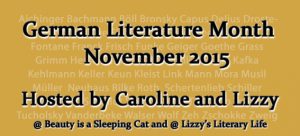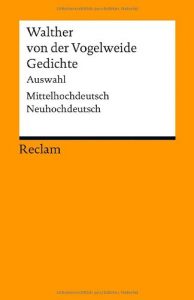This blog post is part of the German Literature Month, hosted by Lizzie (Lizzies Literary Life) and Caroline (Beauty is a Sleeping Cat)
Very little is known about the life of Walther von der Vogelweide, the most remarkable German poet before Goethe; neither the birthplace of this troubadour (Minnesinger) – probably in Austria, but maybe also in Northern Italy – nor his exact years of birth (ca. 1170) and death (ca. 1230) are known. He was obviously the loyal servant of a bishop and was rewarded with an amount of money sufficient for an expensive fur coat once – the only official mentioning of his name in the records and proof of his comparatively elevated social status.
Walther’s poetry is written in Middle High German (Mittelhochdeutsch) which is surprisingly intelligible to modern-day native speakers – especially when you are from Southern Germany or Austria. It covers a number of topics and genres but his love poetry features most prominently. While a big part of it worships an aristocratic, married and therefore inaccessible frouwe from a distance, Walther’s poetry also covers other, to us modern readers more familiar grounds that make his charming poems still very fresh and appealing until this day. I am therefore recommending his works to anyone with a genuine interest in German literature.
In the following Taglied the poet lends his voice to a girl after her spending a night with her lover (most probably a man of higher social status).
Under der linden
Under der linden
an der heide,
dâ unser zweier bette was,
dâ muget ir vinden
schône beide
gebrochen bluomen unde gras.
Vor dem walde in einem tal,
tandaradei,
schône sanc diu nahtegal.
Ich kam gegangen
zuo der ouwe:
dô was mîn friedel komen ê.
Dâ wart ich empfangen
(hêre frouwe!)
daz ich bin sælic iemer mê.
Kust er mich?
Wol tûsentstunt:
tandaradei,
seht wie rôt mir ist der munt.
Dô hete er gemachet
alsô rîche
von bluomen eine bettestat.
Des wirt noch gelachet
inneclîche,
kumt iemen an daz selbe pfat:
bî den rôsen er wol mac,
tandaradei,
merken wâ mir’z houbet lac.
Daz er bî mir læge,
wesse’z iemen
(nu enwelle got!), so schamte ich mich.
Wes er mit mir pflæge,
niemer niemen
bevinde daz, wan er und ich,
und ein kleinez vogellîn:
tandaradei,
daz mac wol getriuwe sîn.
Under the linden tree
Under the linden tree
on the heather,
where we shared a bed
there you may find
lovely together
broken flowers and grass.
Near a forest in a vale,
tandaradei,
beautifully sang the nightingale.
I came to meet him
at the green:
there was my beloved come before.
Such was I received
(Queen of Heaven!)
that I am blessed for evermore.
Did he kiss me?
Perhaps a thousand times and some:
tandaradei,
see how red my mouth has become.
There he had been making
for luxury
a bed from every kind of flower.
It sets to laughing
delightedly
whoever comes upon that bower;
by the roses well one may,
tandaradei,
mark the spot my head once lay.
If someone knew
he lay with me
(may God forbid!), for shame I’d die.
What did he do?
may none but he
ever be sure of that — and I,
and one tiny bird,
tandaradei,
that may well not say a word.
(Translation by Thomas Hübner, after Graeme Dunphy)
For those who read German, I can recommend the edition of Walther’s poetry in the legendary Reclam Universal Edition (bi-lingual, High German/Middle High German), Stuttgart 2013 (“Gedichte – Auswahl”); there is an English edition “Selected Poems of Walther von der Vogelweide: The Minnesinger”, translated by Walter Alison Phillips in 1896 and republished by Cornell University Library in 2009; another more modern translation of the poem in English can be found in Raymond Oliver’s “To Be Plain: Translations from Greek, Latin, French, and German”, Robert L. Barth, 1981
© Thomas Hübner and mytwostotinki.com, 2014-5. Unauthorized use and/or duplication of this material without expressed and written permission from this blog’s author and/or owner is strictly prohibited. Excerpts and links may be used, provided that full and clear credit is given to Thomas Hübner and mytwostotinki.com with appropriate and specific direction to the original content.





 Facebook
Facebook RSS
RSS Twitter
Twitter